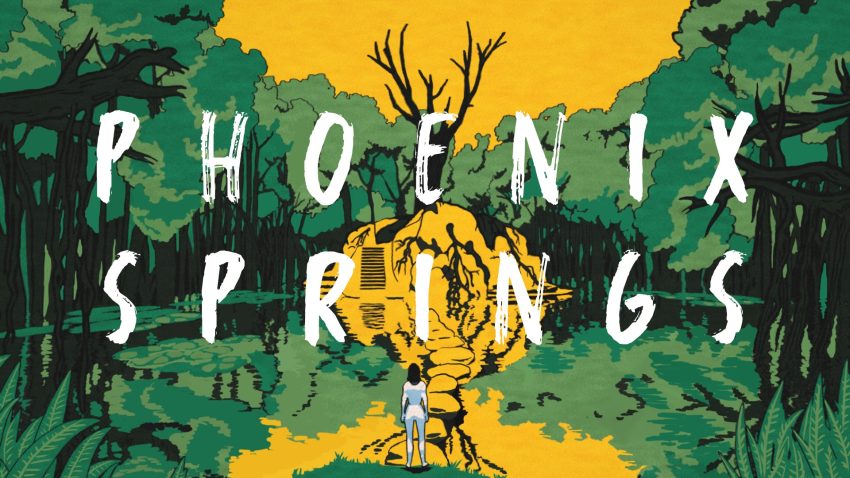Phoenix Springs is a beautiful game with great voice acting and a compelling world built through breadcrumbs that will ultimately leave you with more questions than answers.
What is Phoenix Springs?
Phoenix Springs is the debut title from Calligram Studios. It is a point-and-click adventure where you play Iris, a reporter looking for her brother, Leo. To locate him, you’ll need to search your environment for clues that lead you closer and closer to him while exploring his connection to the mysterious Phoenix Springs.
The core mechanic at play here is the gathering of action words. As you click around to speak to the characters in the world and take a look at items, you will gather words that can help you move the plot forward. Your brother is always at the centre of your word bank, but you’ll gather places, things, concepts and more to move through the world and get closer to him.
You can use the word bank in combination with “talk to” and “look at” action. At the start, I found myself at times confused about exactly how to use the word bank in combination with the third “use” action, but after a few fumbles, I figured it out.

Phoenix Springs is a stunner
Right off the bat, it would be a disservice to not dive in and talk about the style of Phoenix Springs.
To get closer to finding your brother, you’ll mouse around visually stunning maquettes. The game world looks like it was drawn and colored with markers reminding me a lot of early Detective Comics but with a more futuristic look to it. Up close, the art is even more striking, especially when we get to see the faces of characters in close-up moments. We lose a lot of the character detail in parts of the world where the camera is pulled back – but this brave choice strikes me as deliberate and allows the player to feast their eyes on the beautiful painted backgrounds from the team. The lines are always clean and the detail is always awe-striking.
The game colour-wise leans heavily on yellows, blacks and greens with punches of red. The art direction is strong and I hope that the game is recognized for Best Art Direction as we approach the end of year award season.
Beyond the beautiful art, the game has great voice-acting from Alex Anderson Crow. It’s subtle, increasingly despondent and brooding. Her performance combined with the world-building does the most to move the narrative forward.

A pair of Dormers
The game is divided into about half a dozen major areas varying in size. There’s a nice mix of sizes in these areas. Half were quite small and the other half were several times larger than the smaller ones. The tiny ones are easy to crack the codes on. The two larger set pieces, especially the trip to the titular Phoenix Springs, have many nooks and crannies. Even though part of the fun of this is one is poking around the world to see what you can find, I wish the game would have done a slightly better job at signposting for the player. Some paths weren’t immediately obvious. Beyond at times questioning where to go, a few parts of the map in one of the game sections had sub-sections with similar names. This made it tough to navigate without deliberate traversal focus.

Left to your interpretation
Phoenix Springs can be played in a few hours depending on how quickly you can solve some of the game’s tougher puzzles. Some of them are more clever than others – but your satisfaction with this one will depend if you need a story to end by telling you exactly what’s going on. Without spoiling the major plot points, the game does a great job through environmental storytelling at alluding to what’s happened to Leo and the world around you. But even in the end, what the game is trying to say will be left up to you to interpret.

This game is a head-scratching psychedelic near-future neo-noir mystery with a beautiful art style. Just don’t expect it to spoonfeed you the game’s message.
A copy of the game was provided by the publisher for this feature. Reviewed on PC (Steam Deck). One note – this game needs to be played with a mouse.
Looking for another detective game? Check out our review of Duck Detective: The Secret Salami!

Jacob is a creator marketing professional, and a fan of video games. He hosts/produces the Left Behind Game Club and is a co-host of Crossplay Conversations. At conventions and bars, he also hosts Video Game Trivia.

